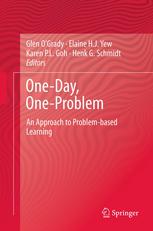

Most ebook files are in PDF format, so you can easily read them using various software such as Foxit Reader or directly on the Google Chrome browser.
Some ebook files are released by publishers in other formats such as .awz, .mobi, .epub, .fb2, etc. You may need to install specific software to read these formats on mobile/PC, such as Calibre.
Please read the tutorial at this link: https://ebookbell.com/faq
We offer FREE conversion to the popular formats you request; however, this may take some time. Therefore, right after payment, please email us, and we will try to provide the service as quickly as possible.
For some exceptional file formats or broken links (if any), please refrain from opening any disputes. Instead, email us first, and we will try to assist within a maximum of 6 hours.
EbookBell Team

5.0
108 reviewsOne-day, one-problem is a unique adaptation of problem-based learning (PBL) pioneered at Republic Polytechnic, Singapore. Here students are challenged each day with a problem from their domain and attain the necessary learning outcomes in the process of responding to the problem. Throughout the day students would engage in small group discussions, self-directed learning and conversations with their teacher who plays the role of a facilitator. This approach to learning and instruction represents a new brand of constructivist learning in a more structured learning environment compared to conventional PBL. This book contains a series of chapters by authors with first-hand experience in the One-day,one-problem PBL approach. Unlike other books on PBL, the chapters are both research-informed and practical. Results of empirical studies into the factors of PBL such as quality of problems, tutor behaviours, scaffoldings, student learning and interest are discussed together with practical implications for the educator.
The book begins with an overview of the one-day, one-problem process, providing a viewpoint from both the student and tutor. Republic Polytechnic’s pedagogical philosophy and epistemological belief of education are introduced with the intent to share how the polytechnic designed and implemented a system that supports the philosophical beliefs. Results and practical implications of empirical studies on the various factors that influence students’ learning in PBL are discussed. These include the quality of problems and the use of scaffoldings for students’ learning, tutors as facilitators, preparation of staff for PBL, student assessment, how students learn in the process of PBL and student interest.